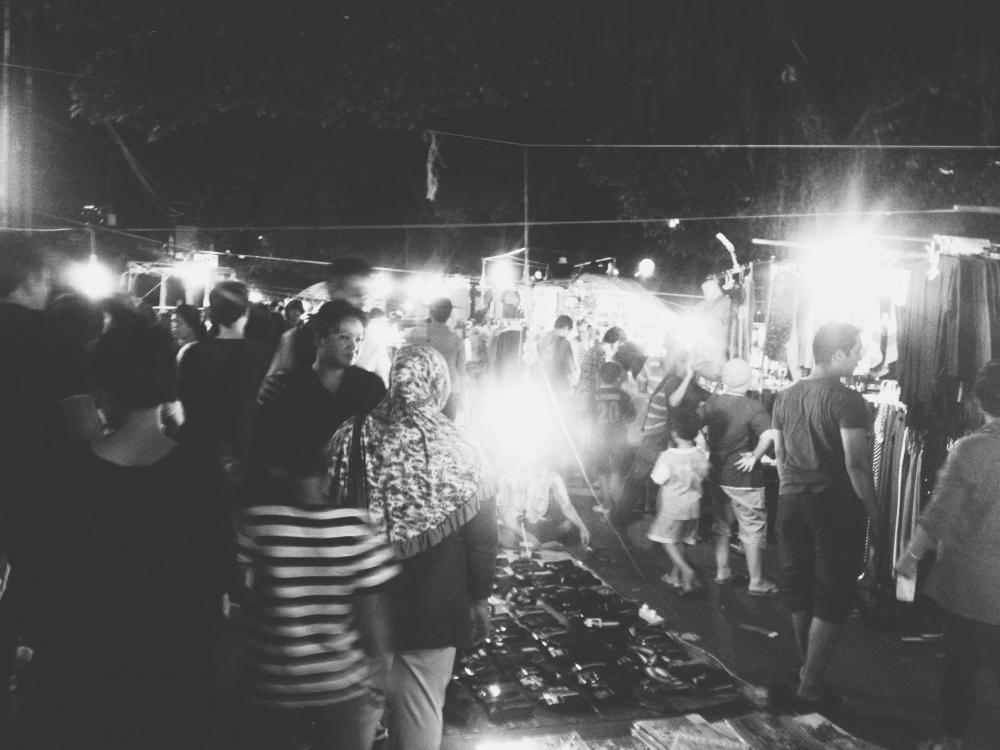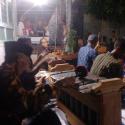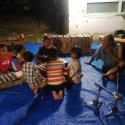The night market or the Pasar Malam gives local residents a familiar outlet for the purchasing of everyday goods such as clothes and DVDs to the more peculiar products of too-good-to-be-true appliances (usually stolen) and gemstones with supposed spiritual powers. The Pasar Malam transforms into a makeshift outdoor retail store to those looking for a good deal on items without converging to the conventional marked-up prices of malls and department stores. Alongside long-term goods, the night market also serves delectable dishes like commonly found roti bakar (grilled bread) to the not-so-commonly-found Indonesian version of escargot: tutut (snails). From cartoon t-shirts to gold (or ‘gold’) watches, the Pasar Malam invites the entire family to indulge in the many goods available for use in the household, schoolyard, and office.
On my first trip to the Pasar Malam, I thought that an 190 cm, half-American half-Indonesian, 19 year old in the middle of Manggarai would most definitely be the subject of glances from every which way. However, to my surprise, aside from a few stares, everybody was smiling and very open to me; joking around about trying to find my shirt size in the Pasar Malam or being the
‘bule pertama yang dateng ke Pasar Malam’ (the first foreigner coming to the night market).
The Pasar Malam is vibrant, cheerful, and welcoming; identical with the very same people who come to the rough-and-ready market, themselves being vibrant, cheerful, and welcoming. Not only do these values exist in the Pasar Malam, they are also integrated throughout the daily lives of the people there. The natural Indonesian mannerism of smiles and laughter resonate throughout and beyond the market.
Lit by suspended wires of bulbs set too low for my height, the glow of the market attracts people from different neighborhoods; giving people the off chance to meeting old friends at the market. Covering a pretty large sized area, the Pasar Malam really acts more as a social event than a place of business transactions.
‘Eh, lo ke Pasar Malem ga entar? Anak-anak Dalem pasti entar mau nongkrong di Bang Alay kelar jualan’
(Hey, are you going to the Pasar Malam later? The guys from Asrama Dalem are going to hang out at Bang Alay’s afterwards.)
In a way, the Pasar Malam connects with all members of society. From the lower class who come to the market for affordable items and interaction with people from other neighborhoods to the upper class who come to the market for affordable items and interaction with people from other neighborhoods. However, the latter group makes up a minority of the people at the market. Usually, it’s Pak RT and Pak RW (community ‘leaders’) who show up to the market with the customary purchase and stroll but mainly, as a way to connect to the community and show the people that they are involved and interested in the current affairs of the society.
As locals shop, they can drop their children off at the makeshift bouncy castle, pumped up minutes before the market starts, to avoid the hassle of screaming kids begging Mommy and Daddy for toys. As Daddy goes off to search for the most appealing counterfeit Armani wallet and belt for the wardrobe and Mommy goes off to socialize with other mothers and buy new clothes for Junior (and maybe a jilbab for herself), Junior has all the time in the world to jump on the bouncy castles, ride on the car battery-powered carousel, and tug on Mommy’s shirt for a works-only-ten-times plastic gun. Junior may just make new friends there though, friends that he’ll hang out with for years. Whether they meet again in elementary school or high school, chances are that the Pasar Malam won’t be the only place where they’ll be friends in.
(This is a fairly common case because public elementary, junior, and high schools are usually selected based on geographical location in addition to economical factors.) Once again, apparent in everyone else who comes to the market, the night at the Pasar Malam is never absent from any smiles and happy faces.
With every good thing though, there must come an end. Although the night market is a special event, it does happen every two weeks (or every month, in some cases). While mothers comfort their crying kids who don’t want to leave the bouncy castle and fathers wrap up their conversations with other fathers from the neighborhood, the air around the market is silent. The raucous and bright surroundings that blared dangdut and the shouting of watch vendors pipes down into a silence of motorbikes turning on, gearing home. The market is set up fast and is also taken down with the same lightning speed, leaving almost no physical trace of its existence the following day.
As I accompany my friend, Acong, on the walk back home, I can’t help but smile as the sounds of ‘Tutut goceng! Goceng goceng goceng!’ (Snails, Rp. 5000) accompany my footsteps home.









